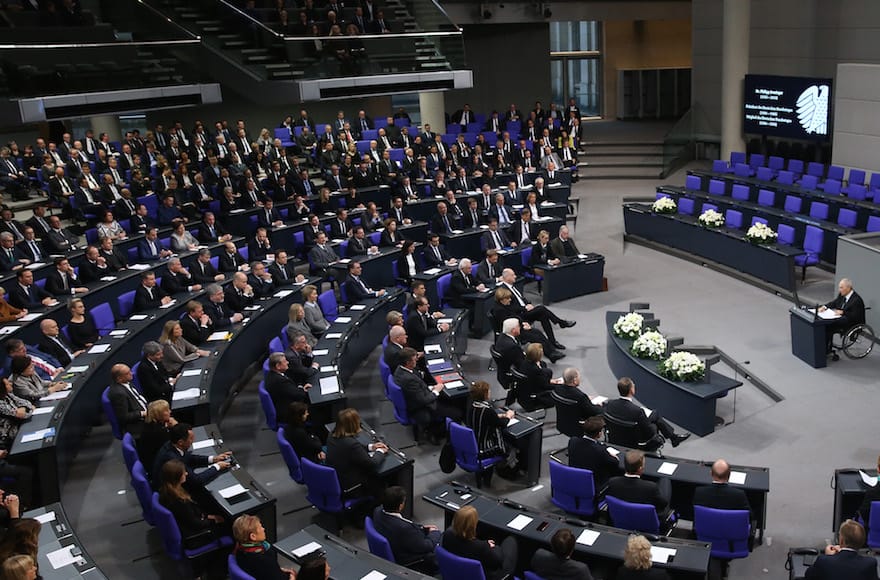Every Day during the Corona crisis our Advisory Board Member Chief Rabbi Binyomin Jacobs (NL) writes a diary, on request of the Jewish Cultural Quarter in Amsterdam, which is published on the website of the NIW, the only Jewish Dutch Magazine. Rabbi Jacobs is the head of Inter Governmental Relationships at the Rabbinical Centre of Europe. We will be regularly publishing a selection of his informative, sometimes light hearted, but always wise pieces.
For our Dutch readers you can follow the diary every day at NIW home page: https://niw.nl and then: scroll down.
Ambassadors are like Rabbis…
Today was all about abroad. The Ambassador of Hungary had invited me to lunch at his embassy. We have known each other for a few years, meet from time to time and so again today. Reason for the visit? No. Just catching up again about kosher slaughter, which was threatening to become a problem in Poland and the relationship between Hungary and Israel.
Because it would not be exactly easy to arrange a kosher meal at the Hungarian embassy, we (my wife and I) invited him to lunch with us.
So,the ambassador came to Amersfoort and we not to The Hague. Not wanting to come empty-handed, he brought a huge bouquet of flowers and a bottle of kosher wine.
How did he get that wine? The ambassador called his friend Naor (the ambassador of Israel) and he arranged for a bottle of kosher Israeli wine from the IPC – the Israel Products Center – in Nijkerk to be delivered to the Hungarian embassy that morning. And because the Ambassador of Hungary did not know about the existence of the IPC, which is ten minutes from my house, I took him there after lunch. Of course I made sure that in addition to the tour and explanation about the objective of IPC and Christians for Israel, he also received a pack of cookies. Because: tomorrow the ambassador of Israel will visit the Hungarian ambassador and then it seemed nice that I then pay back the bottle of wine via a roll of kosher Israeli biscuits.
Apart from that, I gave the ambassador a mask with “I love Israel” on it, so that the Hungarian ambassador can wear it when the Israeli ambassador comes to make his appearance.
Networking is something like that. Usually it does not deliver on the spot, but is important nonetheless. Ambassadors do no different, and are a bit like rabbis, at least my kind of rabbis.
Because I believe that the rabbi is of course primarily there for the Jewish community in its full breadth. But for that Jewish community, contact with outside that community is also of vital importance, because we are part of the wider society: Noah had to leave the Ark by order of Gd!
Apart from the importance for the Jewish community, we also have a duty, in my opinion, to contribute to the well-being of the surrounding society. Yesterday I had a visit from another kind of ambassador, namely Dr. Pieter de Boer, member of the deputy Church and Israel of the CGK-Christelijk Gereformeerde Kerken- and spokesperson of the Interkerkelijke Werkgroep. That Working Group had drawn up a statement of guilt on the attitude of the churches during and shortly after the war. Today, that statement of guilt was officially released.
Although for me such a debt declaration is not really necessary, I was especially touched by the comment about what went wrong after the war. My grandfather and grandmother’s nephews and nieces were not allowed to be raised with my grandfather and grandmother, but were to remain in the Christian homes where they had been in hiding. Of course, those parents had bonded with the kids, saved their lives, but … they really hadn’t given up their murdered parents with the intention of being raised as Christians.
And whilst with the ambassador: a phone call from Ukraine. One of the rabbis was in a conflict with Christians for Israel supporting him with an adoption project. People in the Netherlands adopt a poverty-stricken Jewish family in Ukraine for € 25 per month. In Kirovograd, communication between the Dutch donors and the local rabbi did not go well. And so I get a call from the rabbi and start mediating or solving, as a kind of ambassador of whom I really don’t know, but I am somewhere in between.
After the necessary phone calls, I hope that I have been able to straighten everything out again and that it also runs smoothly in Kirovograd. What is difficult here is that the local rabbi speaks fluent Russian, but no Yiddish, poor English and not optimal Hebrew, and certainly no Dutch! But I believe I’ve been able to tie things together again. In the meantime, I am waiting for the results of an archival investigation to confirm someone’s Jewishness. I feel that it can be checked that way, but not everyone shares my opinion that (almost) everything should be tackled immediately. In principle, I always answer e-mail immediately.
As a result, I sometimes spend late at night behind that stupid computer that has been controlling my whole life!
But Good news! At least in my opinion. Because, of course, it is really not the case that a hundred listeners are more important than ten at a lecture, and the same goes for the number of readers of my diaries, still, I have to admit my weakness in this, I like that my diaries are getting wide read. And so: Good news for me! Coincidentally (although I really believe that coincidence does not exist) the EJA –European Jewish Association- saw one of my diaries, translated it with Google and asked permission to post this diary a few times a week on their website and their Facebook. And thus more readers. My diary is going European!














